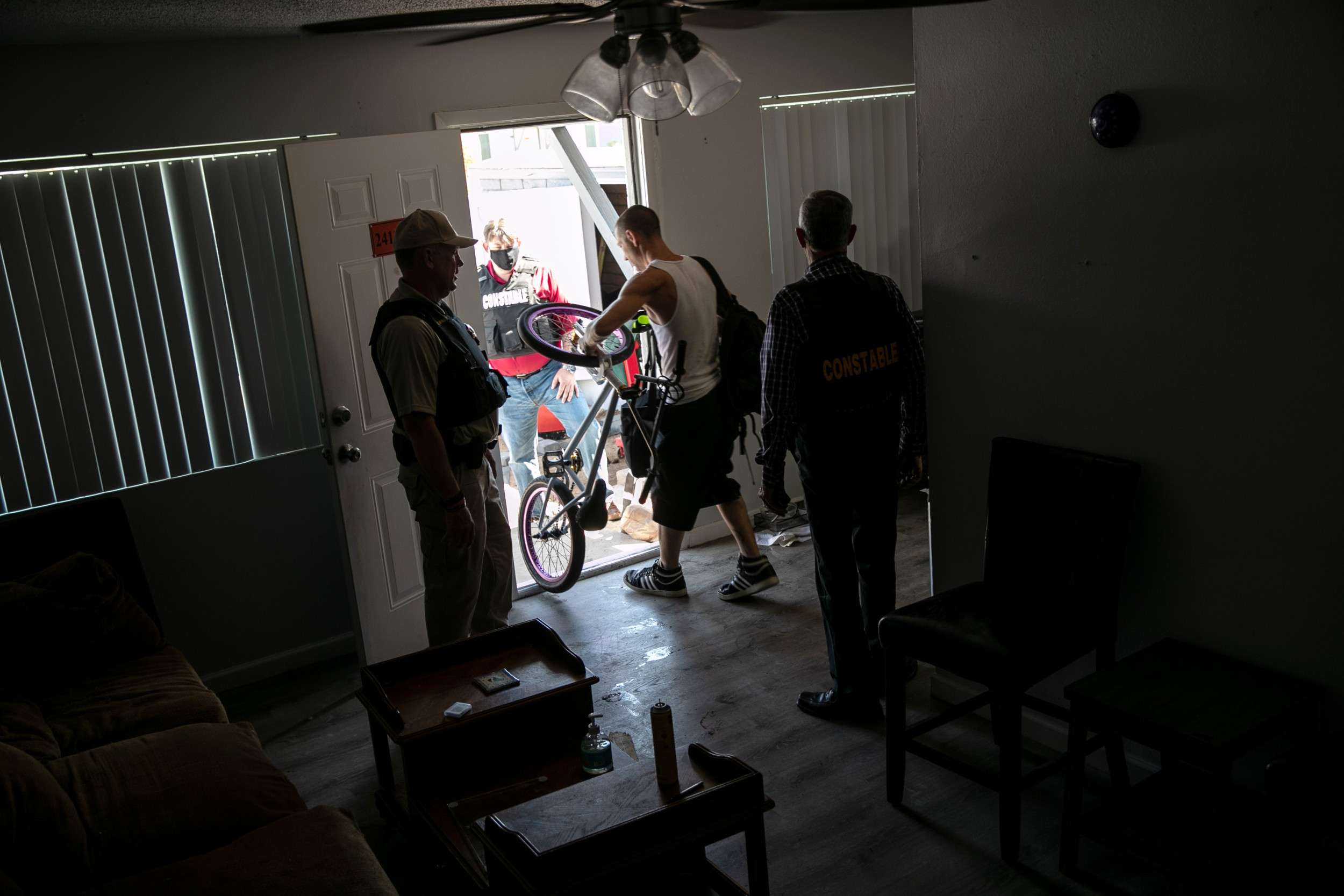Understanding Squatters Rights In Wisconsin: A 30-Day Rule Overview
Wisconsin’s laws regarding squatters rights have long been a topic of interest for both property owners and tenants. The concept of adverse possession, commonly known as squatters rights, allows individuals who occupy a property without legal ownership to potentially gain ownership under certain conditions. In Wisconsin, the 30-day rule plays a pivotal role in determining how quickly legal action must be taken to prevent unauthorized occupancy. This article delves into the intricacies of squatters rights in Wisconsin, focusing on the 30-day timeline and its implications for property owners and occupants alike.
As property disputes continue to rise, understanding squatters rights becomes crucial for safeguarding your real estate investments. This article will explore the nuances of the 30-day rule in Wisconsin, offering actionable insights to help property owners navigate the legal landscape effectively. Whether you're a landlord, tenant, or aspiring property owner, this guide will equip you with the knowledge needed to protect your interests.
Through a blend of expert analysis and practical examples, we aim to demystify the complexities surrounding squatters rights in Wisconsin. By the end of this article, you'll have a comprehensive understanding of the 30-day rule and its impact on property ownership disputes. Let's dive in and explore the details.
Read also:Patrick Whitesell Fortune Exploring The Wealth And Success Of A Hollywood Powerhouse
What Are Squatters Rights in Wisconsin?
Squatters rights, or adverse possession, refer to the legal process where an individual can claim ownership of a property by occupying it for a specific period. In Wisconsin, this period typically spans 10 to 20 years, depending on the circumstances. However, the "squatters rights 30 days wisconsin" rule highlights the urgency for property owners to address unauthorized occupancy promptly. This timeframe underscores the importance of timely legal action to prevent claims of ownership.
The concept of squatters rights is rooted in the principle that land should not remain idle or neglected. By allowing occupants to claim ownership, the law incentivizes the productive use of property. However, this also places a significant responsibility on property owners to monitor their land and take swift action against unauthorized use.
How Does the 30-Day Rule Apply to Squatters Rights in Wisconsin?
The 30-day rule in Wisconsin is a critical component of squatters rights. It mandates that property owners must initiate legal proceedings within 30 days of discovering unauthorized occupancy to prevent squatters from establishing a claim. This timeframe is crucial because it sets a clear deadline for action, ensuring that property disputes are resolved efficiently.
Failure to adhere to the 30-day rule can result in significant legal challenges for property owners. Squatters may use this period to strengthen their claim by documenting their occupancy and demonstrating continuous use of the property. Understanding the implications of this rule is essential for anyone dealing with squatters rights in Wisconsin.
Can Squatters Legally Claim Ownership in 30 Days?
While the 30-day rule emphasizes the urgency for property owners to act, it does not mean squatters can claim ownership within this timeframe. Instead, it serves as a warning to property owners to address unauthorized occupancy promptly. For squatters to legally claim ownership, they must meet stringent conditions, including continuous and open occupancy for the statutory period, which is typically 10 to 20 years in Wisconsin.
This misconception often arises due to the emphasis on the 30-day deadline, but it is crucial to differentiate between the initial response period and the overall requirements for adverse possession. Property owners should consult legal experts to understand the full scope of squatters rights and the steps needed to protect their interests.
Read also:Understanding 1 Knot Mph A Comprehensive Guide To Speed Measurement
What Steps Should Property Owners Take Within the First 30 Days?
Property owners facing unauthorized occupancy must act swiftly to protect their interests. Here are some critical steps to consider:
- Document the unauthorized occupancy with photographs and detailed records.
- Consult a real estate attorney to understand your legal options and rights.
- File a formal complaint or eviction notice within the 30-day window to prevent squatters from establishing a claim.
- Monitor the property regularly to ensure compliance with legal requirements.
By taking these proactive measures, property owners can mitigate the risks associated with squatters rights in Wisconsin and safeguard their investments.
What Are the Legal Requirements for Squatters to Claim Ownership?
For squatters to claim ownership under adverse possession laws in Wisconsin, they must meet several stringent conditions:
- Hostile Claim: The squatter must occupy the property without the owner's permission.
- Actual Possession: The squatter must physically occupy the property and treat it as their own.
- Open and Notorious Use: The occupation must be visible and obvious to anyone observing the property.
- Exclusive Possession: The squatter must be the sole occupant of the property during the statutory period.
- Continuous Use: The occupation must be uninterrupted for the required statutory period, typically 10 to 20 years.
Meeting these conditions is challenging, but understanding them is vital for both property owners and squatters navigating the complexities of squatters rights in Wisconsin.
Why Is the 30-Day Rule Important for Property Owners?
The 30-day rule serves as a critical safeguard for property owners in Wisconsin. It ensures that unauthorized occupancy is addressed promptly, reducing the risk of squatters establishing a claim. By enforcing this rule, the law promotes responsible property management and discourages neglect or abandonment.
Property owners who fail to act within this timeframe may face prolonged legal battles and potential loss of ownership. The 30-day rule emphasizes the importance of vigilance and proactive measures in protecting real estate investments.
How Does the "Squatters Rights 30 Days Wisconsin" Rule Impact Property Values?
The implications of the "squatters rights 30 days wisconsin" rule extend beyond legal disputes, affecting property values and market perceptions. Properties with a history of unauthorized occupancy may suffer from reduced marketability and decreased valuations. This is because potential buyers often perceive such properties as high-risk investments, requiring additional due diligence and legal scrutiny.
Furthermore, the presence of squatters can lead to property damage, vandalism, or neglect, further diminishing its value. Property owners must weigh the costs of eviction and restoration against the potential long-term benefits of maintaining a property's market value.
What Should Squatters Know About Adverse Possession in Wisconsin?
Squatters seeking to claim ownership through adverse possession must navigate a complex legal landscape. Understanding the requirements and limitations of squatters rights in Wisconsin is essential for anyone considering this path. Here are some key points for squatters to consider:
- Adverse possession requires a significant time commitment, typically 10 to 20 years, depending on the circumstances.
- Squatters must occupy the property openly, continuously, and exclusively during the statutory period.
- Legal challenges from property owners can disrupt the process, potentially invalidating the claim.
While adverse possession offers a pathway to ownership, it is not without its challenges. Squatters must carefully evaluate their options and seek legal advice to ensure compliance with Wisconsin laws.
Can Property Owners Prevent Squatters From Establishing Rights?
Yes, property owners can take several measures to prevent squatters from establishing rights under adverse possession laws. These include:
- Regular inspections of the property to detect unauthorized occupancy early.
- Installing security measures, such as locks, fences, and surveillance systems, to deter unauthorized access.
- Posting clear "No Trespassing" signs to reinforce ownership and discourage squatting.
- Responding promptly to any signs of unauthorized occupancy by initiating legal action within the 30-day window.
By implementing these preventive measures, property owners can minimize the risks associated with squatters rights in Wisconsin and protect their investments.
Conclusion: Navigating Squatters Rights in Wisconsin
In conclusion, the "squatters rights 30 days wisconsin" rule highlights the importance of timely action in addressing unauthorized occupancy. Property owners must remain vigilant and proactive to protect their interests and prevent potential claims of ownership. By understanding the legal requirements and taking appropriate measures, both property owners and squatters can navigate this complex landscape effectively.
As the real estate market continues to evolve, staying informed about squatters rights and adverse possession laws is crucial for anyone involved in property ownership or occupancy. This article has provided a comprehensive overview of the topic, equipping readers with the knowledge needed to make informed decisions.
Table of Contents
- What Are Squatters Rights in Wisconsin?
- How Does the 30-Day Rule Apply to Squatters Rights in Wisconsin?
- Can Squatters Legally Claim Ownership in 30 Days?
- What Steps Should Property Owners Take Within the First 30 Days?
- What Are the Legal Requirements for Squatters to Claim Ownership?
- Why Is the 30-Day Rule Important for Property Owners?
- How Does the "Squatters Rights 30 Days Wisconsin" Rule Impact Property Values?
- What Should Squatters Know About Adverse Possession in Wisconsin?
- Can Property Owners Prevent Squatters From Establishing Rights?
- Conclusion: Navigating Squatters Rights in Wisconsin


